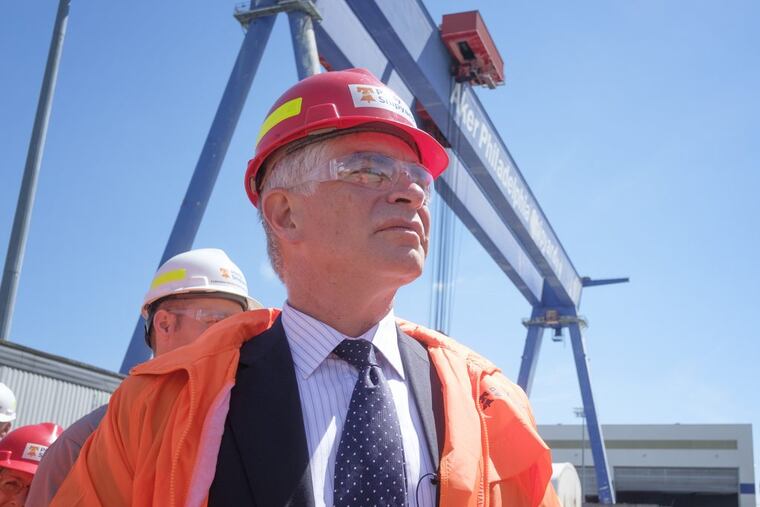Mystery Fed candidate won seat at FOMC table, then walked away
Someone was chosen by the regional board in 2015 and unanimously approved in a Feb. 18 vote, and then, unexpectedly, turned down the job.

Who got an invitation from Janet Yellen to sit at the most exclusive economic-policy table in the world, and turned it down?
The Federal Reserve isn't saying.
The appointment of a new president for the Federal Reserve Bank of Philadelphia in 2015 was controversial almost from the start. Soon after Patrick Harker was named to the job, it emerged that, as one of the bank's directors, he had been part of the search before throwing his hat in the ring at the urging of his board colleagues.
The disclosure bolstered accusations that the process for choosing presidents of the 12 regional Fed banks, whose decisions influence the entire U.S. economy, lacked transparency and favored insiders. Now it appears there was another twist to the tale that was kept under wraps and that the Fed will not fully explain.
Previously unreported documents — obtained under a Freedom of Information Act request by the activist group Fed Up and shared with Bloomberg News — show that Harker was not the first person nominated by the Philadelphia board for the leadership post. Someone else, whose name was redacted from the documents, was chosen by the regional board in February 2015. The Board of Governors in Washington, headed by its chair, Yellen, unanimously approved the nomination in a Feb. 18 vote.
Then the nominee turned down the job.
At that point, the Philadelphia board turned to Harker and asked him to reconsider his earlier decision not to be a candidate, and Harker agreed. Eight days later, on Feb. 26, he was unanimously approved by the Board of Governors in a new vote.
Respecting Privacy
Michael Angelakis, chairman of the Philadelphia board, wrote in an emailed response to questions that he would not disclose the identity of the initial nominee "in an effort to respect the individual's privacy and the integrity of the presidential search process." Nor would he say why that person withdrew so late, or explain why the full sequence of events was not made public.
David Skidmore, a spokesman for the Board of Governors, wrote in an email that because it was a personnel matter he also would not identify the person or say why the person did not accept the job.
"This kind of secrecy for secrecy's sake is exactly the stuff that stirs the pot and hostility for the Federal Reserve system," said Peter Conti-Brown, a Fed historian and assistant professor at the University of Pennsylvania.
"The benefits of this level of secrecy are, ostensibly, it facilitates a process that gets you the best candidates," he added. "I simply don't believe the benefits are so big as to justify all the opacity, confusion, and conspiracy mumbling, and even deep conflicts that may go undetected."
The Fed usually discloses senior personnel decisions by the Board of Governors in a weekly release titled "Actions of the Board, Its Staff, and the Federal Reserve Banks." The vote on Harker was published in early March, just after the Philadelphia Fed publicly announced the appointment. The vote approving the candidate who subsequently withdrew never appeared.
The Fed's Skidmore said the Board of Governors has no legal requirements to report personnel decisions, though it is the central bank's practice to do so for senior appointments. But, he added, "Only final actions are listed; appointments that do not become effective are not listed."
Not Accepted
In this case, he said, the vote "had the effect of authorizing the Federal Reserve Bank of Philadelphia's board to extend an offer to a candidate for president." That action did not become final because the candidate did not accept the offer, Skidmore said.
Aaron Klein, a fellow at the Brookings Institution in Washington who has criticized the selection process for Fed bank presidents, was not convinced by the explanation.
"If the Federal Reserve Board of Governors formally voted to approve a person to be president of the Philadelphia Fed, they should release that vote and explain what happened," he said.
The Fed's 12 regional banks help run the country's interbank payments system, supervise and regulate banks, conduct community development projects, and perform economic research. Each reserve bank president also sits on the Federal Open Market Committee, the panel that sets the central bank's benchmark interest rate and takes other crucial monetary policy decisions.
Given the level of public trust placed in those officials, Penn's Conti-Brown said, the processes leading to their appointments should be more open. "They are engaging in some of the most important public policy-making that this nation undertakes," he said.
Firm’s Review
Angelakis said an executive search firm reviewed "well over 100 resumes" and presented "more than a dozen" finalists to the regional board's search committee for in-person interviews. In the end, he said, the process led to the most qualified candidate.
"I think we all are very fortunate to have Patrick as the president of the Philadelphia Fed," Angelakis said by email. "He is incredibly qualified and has made a positive impact on the bank and the Fed system."
For Klein, the new information rekindles questions about the propriety of the Philadelphia board's decision to select Harker rather than another candidate from among finalists who emerged from the five-month search process.
"The issue isn't whether a person is doing a great job or not. The issue is whether the process reserve banks use is sufficiently democratic, transparent, and accountable," he said.